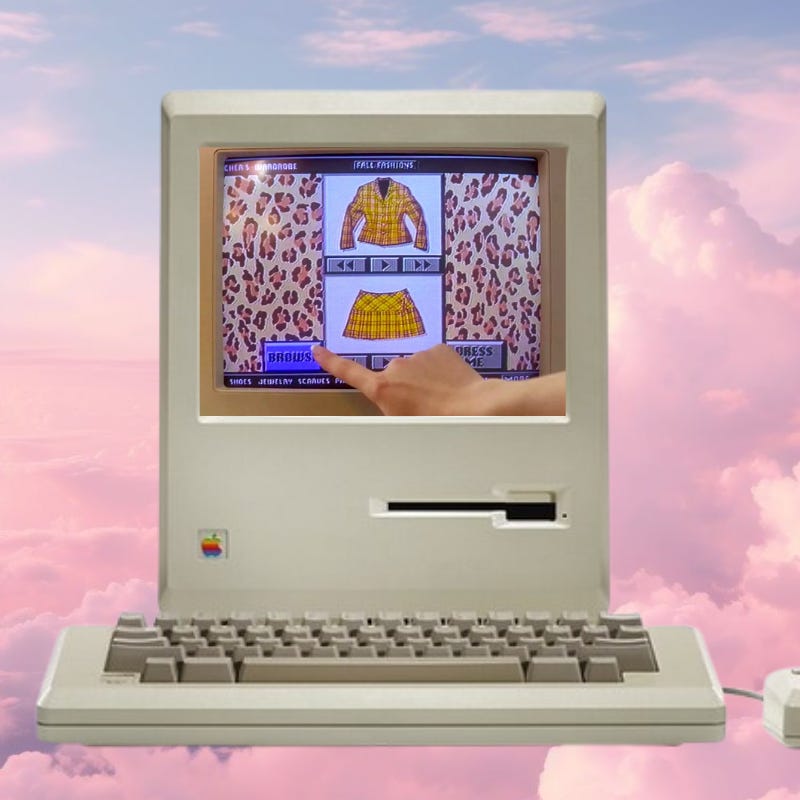Why search will soon feel nostalgic
a few months ago a friend and I were walking around Max Mara when she gasped.
the perfect cropped puffer coat hung right in front of her. the one she'd "been looking for forever" (her exact words)
twenty minutes later, after she’d modeled it zipped/unzipped/inside out/upside down/possibly backwards she hung it back up.
"wait, what?" I asked. "you were obsessed with that coat. why aren't you buying it?"
she leaned in. "why would I pay $1,200 when ChatGPT can find me the same one for a better price?"
the sales associate waved goodbye, entirely unaware of my friend’s intentions.
and that's when I realized my friend never really had to search for anything - at least not in the traditional sense.
Google’s stopped banking on traditional search
every single marketing “expert” or SEO “expert” has claimed, yet again, that search has died. frankly, we’ve held this funeral 15 times.
but really, search is just ghosting us - and if we’re being honest, we’re ghosting it first.
my friend above didn't type "cropped puffer coat” into a search bar. she didn't doomscroll and amass 80 browser tabs in one session. she just screenshotted the coat, sent it to an AI and said "find me this exact coat, but wallet friendly"
and this is what I’ll call pre-search (and no, it’s not exactly zero-click, and it’s not predictive search either)…
pre-search: when AI acts on implicit signals (images, behaviors, patterns) before you formulate a traditional query. no search bar, no keywords, just context and inference*
zero-click: you type a specific query, and Google (or an LLM) answers directly. still requires conscious intent and specific keywords.
pre-search will help your brain do a little bit less work. and who doesn’t want that?
*note: in my research, terminology did not exist to describe this capability. so I made it up. but if you know what it’s already being called, please lmk in the comments!
you've already been living it
AI and this type of agentic behavior aren’t necessarily new.
when's the last time you actively searched for toilet paper? unless you’re deeply passionate about testing different brands, chances are it just shows up at your doorstep every few months. Netflix queues up your next show before you've fully recovered from the last one. and Spotify’s Discover Weekly understands your music taste better than anyone - even yourself.
in reality, we’ve been conditioned to see this coming from a mile away:
2010: "customers who bought this also bought..." (cool)
2015: "based on your listening history..." (ok, helpful)
2020: "you might be running low on..." (stalkerish but practical)
and soon, it’ll be:
2026: "I noticed you usually order the same lunch on Tuesdays, so your order is ready for pick up” (oh WOW)
2028: "your favorite band just announced another stop and I’ve already secured tickets for you and your friend” (wait…an agent could potentially save me from TICKETMASTER?)
(potential) practical applications for skeptics
if the past isn’t an indication of the future for you, let’s pivot.
think about your day-to-day right now. surely there are opportunities where agents could step in and help you.
I’ll give you a very real scenario that involves searching and time, one that I experience often: Resy.
how often have you been on a waitlist for a restaurant, only to watch your phone like a hawk when a new reservation becomes available?
what if you could pay an additional amount to have an agent secure your spot instead when something pops up? maybe even a barter between agents if it’s in demand?
sound bad? ok, what about this?
your AI books restaurant reservations based on your Slack message sentiment analysis. a bad day might mean you’re going somewhere that has your very favorite dessert, thanks to your agent. one less thing to think about.
could be cool…
what this means for brands (and marketers)
all of this fundamentally shifts the behavior between searching and doing.
so most brands need to figure out now how to co-exist and program robots instead of programming for humans.
robots won’t care if a CEO got a full length feature in Forbes about climbing the corporate ladder. but since an AI agent is working on you (the customer’s) behalf, it will care about Reddit reviews, and whether someone in r/BuyItForLife recommends a product.
much of the future will involve marketing to AI. humans will be out of the picture.
the beautiful chaos of what’s to come
now there’s a reason why this isn’t available TODAY. and that’s because if you’ve ever used AI, you know that it can hallucinate - badly.
sometimes ChatGPT will interpret a cropped white puffer as a Michelin-man inspired outfit, just like the online grocery order you’ve placed incorrectly assumes a substitute for an item.
while hallucination may never go away, we will see AI’s responsibilities and capabilities drastically increase.
in the future, your agent will know:
your size (and your “period bloat” size)
your budget (including your “little treat” budget)
your ethics (no fast fashion)
your aesthetic (90s grunge meets soft girlcore)
physical stores may just become experiential playgrounds for you to try things on, express what you’re interested in, and train your agent.
next time, my Max Mara friend's phone camera will be teeing up about six different nicely priced options to be delivered straight to her condo.
the real question nobody's asking
yes, we’ve already mourned traditional search, and we’ve accepted that AI search is a thing.
but the bigger question now becomes - what could happen to wanting itself?
when algorithms answer questions before we ask them, when they fulfill needs before we feel them, are we outsourcing our own desire? or will it give us more time to get inspired and be out in the world, the utopian flip side of the dystopia everybody is always talking about?
my friend found her perfect coat; she just technically never bought it. her AI will find the same coat for a better price, and she'll be satisfied enough. but that Max Mara moment of discovery and joy is something that AI can’t replicate. as time goes on, even if we become more efficient, we might miss the steps that allow us to think for ourselves.
but honestly? that coat really was perfect on her.
thanks for taking the time to read!
some things I’m up to:
building my Future-Proof workshop for C-suite/brand teams who want to stay ahead (DM me if you’re interested - more info coming soon!)
running my own private Slack community for female founders who want to show up on social
hosting a few incredible workshops with Bonfire in Burgundy, France in September for those who feel creatively burned out (come join us and hit the reset button!)
lmk in the comments - are you open to using AI agents? have you noticed your search behavior changing - and are you ok with it?






I guess I'm one of those generative-Ai haters, as I plainly refuse to use it, only in extreme emergencies or for technical stuff, like helping me with an Excel formula (even those he get's wrong a lot of times), so I might be biased in my opinion, but trying to leave aside my concerns for this kind of Ai (not all Ai is bad); I don't know if these Ai agents will take the wheel in taking small decisions for us, like ordering a repeating takeout or placing a reservation at an restaurant any time there is an opening.
Maybe managers search this technology to replace repetitive tasks and even humans, as it's supposedly cheaper (at the moment it's still not), and more time efficient, but as a consumer I'm not sure if this will fly, as people do like to feel in control. I think even your friend made a choice of not buying the coat that was shown in front of her and decided to search with Chat GPT, if she finds something cheaper, it's still her choice if she will buy it. If there is any control or real decision making is a debate for later, but even if the control doesn't exist, we do like the illusion of choice. If your Ai would reserve a time at a restaurant without consulting you first, just announcing you it's done, I'm not sure if people would like that. Even if we accept this, I think the satisfaction level in our lives and loneliness would fall in a pit even deeper, as we socialise even less with humans to make plans and we get less things done.
Even though we tell ourselves this is for saving time, to have more time for living life, unfortunately, history shows us that we will be probably consumed sometimes elsewhere, feeling more miserable than before.